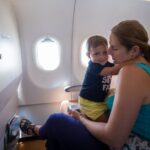Last Updated on September 20, 2023 by Muhammad Sohaib
The arrival of a new baby is a joyous occasion for any family. However, it can also bring about a series of challenges, especially when you have a 3-year-old at home.
This transition can lead to a variety of behavior problems in your toddler as they adjust to the changes in the family dynamic
In this article, we will explore the common behavior issues that 3-year-olds may exhibit after the arrival of a new sibling and provide valuable insights and strategies to help parents navigate this crucial phase.
The Impact of a New Sibling On a 3-Year-Old
Turbulent Emotions
Undoubtedly, a 3-year-old might experience a wide range of emotions upon the birth of a new baby. They may feel excitement, jealousy, confusion, or even sadness.
- Excitement
Initially, a 3-year-old can be ecstatic to get a new sibling. They might be excited about the idea of a new playmate and the impending arrival of the baby.
- Jealousy
Jealousy can surface as reality sets in. The attention the newborn is getting from parents and other adults may make the 3-year-old jealous. Acting out might result from this jealousy.
- Confusion
A young child may find the changes in schedules, sleeping habits, and family dynamics puzzling. They can find it difficult to comprehend how things are different today and why they aren’t their parents’ only priority.
- Sadness
Some 3-year-olds may also experience sadness as they attempt to understand the changes in their family dynamic. They could be a little depressed about all the new things going on around them and miss the unique attention they used to receive.
Understanding and acknowledging these emotions is the first step in addressing behavior problems.
Common Behavior Problems
It’s essential to recognize that 3-year-olds often express their emotions and stress through behavior. Some common behavior problems that may arise after the arrival of a new baby include:
1- Tantrums
Your child might have more frequent and intense tantrums as a way of seeking attention.
2- Attention Seeking
In response to the arrival of a new sibling, 3-year-olds frequently clam up or throw temper tantrums in an effort to get their parents’ attention. They do this as they adjust to the changes in family dynamics and want to recover the focus and affection they were used to before the arrival of the child.
3- Regression
Regression is a common behavior problem among 3-year-olds. They may start exhibiting behaviors they had outgrown, such as thumb-sucking, bedwetting, or baby talk, as a way to regain lost attention.
4- Sibling Rivalry
Sibling rivalry is another common issue that emerges after the arrival of a new baby. 3-year-olds may display aggression towards their sibling or act out to gain superiority.
Strategies to Address 3-Year-Old Behavior Problems After New Baby
Keep to Your Child’s Usual Routine
Keep to Your Child’s Usual Routine” means sticking to the familiar daily schedule your child is used to.
This consistency offers them a sense of security, which is especially valuable when a new baby is introduced into the family.
By maintaining their established routines, like mealtime and bedtime, you create a stable environment that aids their adjustment during this transitional period.
Cherished Moments – Special One-on-One Time
Spend as much time as possible alone with your older child. This gives them comfort in knowing they are still loved and valued. Engage in activities they enjoy, which can help alleviate feelings of neglect.
Positive Reinforcement
Positive Reinforcement” means recognizing and rewarding your child when they behave well and cooperate. This could involve praising their good actions and occasionally offering small rewards, like extra playtime or a favorite treat. It’s a way to encourage them to adapt positively to the changes brought by the new baby and promotes a harmonious family atmosphere. This positive feedback helps strengthen your parent-child bond and boosts their confidence.
Engage Your Child: Involving Them with the New Baby
“Involving Them” means actively inviting your child to take part in caring for the new baby. This could include tasks like helping fetch diapers or singing lullabies to the baby. By encouraging their participation, you nurture a sense of responsibility and inclusion. This involvement not only makes them feel valued but also helps them adjust to the new family dynamic, fostering a stronger bond between siblings.
Consultation with a Professional
You might find it helpful to seek advice from a paediatrician or child psychologist if you see that your child’s behavioural issues continue or get worse. These experts can provide specialised advice and support adapted to the particular circumstances facing your family.
Conclusion
After having a new baby, managing the behaviour issues of a 3-year-old involves tolerance, empathy, and proactive parenting. You may make this adjustment easier for your family by attending to your child’s emotional needs, keeping routines, and involving them in the care of the new sibling.
Keep in mind that every child is different, therefore it’s crucial that you adapt these approaches to fit your particular situation. With time and effort, you can create a harmonious family environment where both your 3-year-old and the new baby can thrive.
If you want to read more information about parenting , just visit momschild.com.







always i used to read smaller articles that also clear their motive, and that is also happening with this post which I am reading at this place.
I’m really enjoying the design and layout of your blog.
It’s a very easy on the eyes which makes it much more enjoyable for me to come here
and visit more often.
Greate post. Keep writing such kind of information on your site.
Im really impressed by your site.
Hello there, You’ve done a great job. I’ll definitely digg it and in my view recommend to my friends.
I am confident they will be benefited from this website.
Thank you so much for your kind words and support! I’m truly glad you enjoyed the post and the website. Your encouragement means a lot, and I really appreciate your intention to recommend the site to your friends. I’m committed to continuing this journey of sharing valuable information, and I hope every visit brings you something useful. Thanks again for your wonderful feedback!
Hi, i think that i saw you visited my site so i came to “return the
favor”.I’m attempting to find things to enhance my web site!I suppose its ok to use a few of your ideas!!
Hello there! Thanks for stopping by and for your thoughtful note. I’m glad you enjoyed visiting my site, and it’s great to hear you’re looking for inspiration to enhance your own website. Feel free to use any ideas you find useful—I’m happy to share and support fellow web enthusiasts. If you ever want to discuss more tips or brainstorm further, just let me know. Happy designing and best of luck with your site!